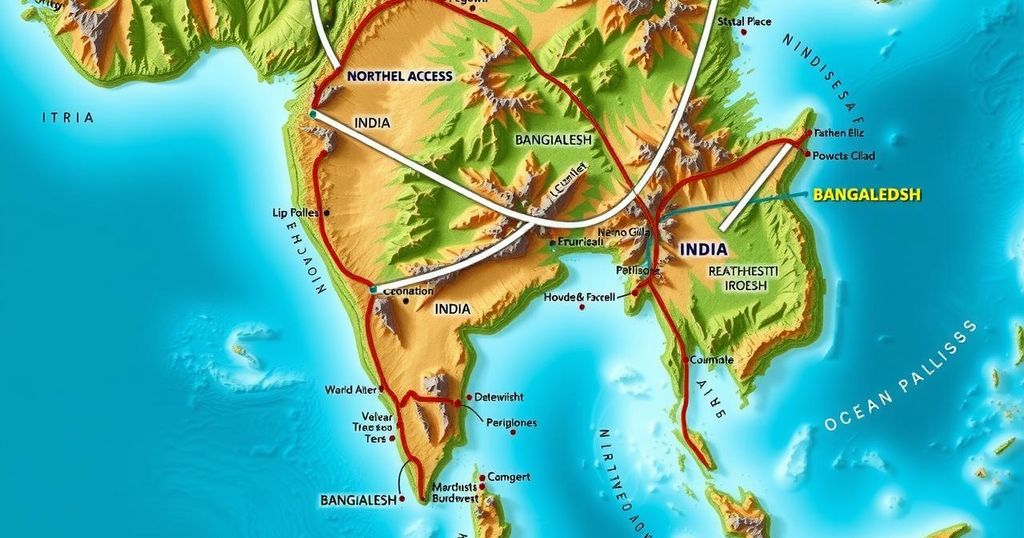Politics
ASIA, BANGLADESH, BEIJING, BENGAL, BILATERAL COOPERATION, CHICKEN ’ S NECK, CHINA, DELHI, DHAKA, ECONOMIC COOPERATION, HAS, INDIA, INFRASTRUCTURE PROJECTS, INTERNATIONAL RELATIONS, MEXICO, MUHAMMAD YUNUS, NEW DELHI, NORTH AMERICA, NORTHEAST, NORTHEAST INDIA, SEVEN SISTERS, SHEIKH HASINA, TRADE, XI, XI JINPING, YUN, YUNUS
Sophia Klein
Bangladesh’s Strategic Role: Yunus Advocates for Ties with China to Access Northeast India
Professor Muhammad Yunus, chief advisor of Bangladesh’s interim government, emphasized the strategic significance of Bangladesh for Northeast India during his recent visit to China. He advocated for stronger economic ties with China, positioning Bangladesh as a crucial link for Indian access to the ocean. Yunus’s statements suggest a shift in regional geopolitics, raising concerns for India regarding its strategic interests.
During a recent visit to China, Professor Muhammad Yunus, the chief advisor to Bangladesh’s interim government, emphasized the strategic importance of his country for accessing the ocean, particularly for Northeast India, which he described as being landlocked. Yunus asserted that Bangladesh serves as the “only guardian of the ocean for all this region,” pointing out the geographical challenge faced by the seven northeastern states of India that are isolated from direct access to sea routes.
Yunus’s remarks posited that Bangladesh could act as a critical link for the extension of the Chinese economy, stating, “This opens up a huge possibility. So this could be an extension of the Chinese economy. Build things, produce things, market things, bring things to China, bring it out to the whole rest of the world.” These comments suggest an intent to leverage Bangladesh’s geography to enhance its economic partnership with China, positioning it as an alternative to Indian access routes.
The “Chicken’s Neck” corridor, which connects India’s Northeast to the rest of the country through north Bengal, presents significant economic and strategic challenges for India. Yunus’ comments, viewed as an assertion of Dhaka’s influence, may raise concerns in New Delhi regarding the burgeoning ties between Bangladesh and China. In light of these comments, Washington is monitoring the evolving dynamics in the region closely.
At the conclusion of his visit, Yunus expressed optimism about future relations with China, highlighting the importance of perceiving Beijing as a “good friend” amidst Bangladesh’s economic difficulties. Following a meeting with Chinese President Xi Jinping, Yunus sought increased investments to bolster his nation’s struggling economy, suggesting that relations between the two countries are poised to enter a new phase of collaboration.
Moreover, Yunus underscored Bangladesh’s strategic partnership with China as a counterbalance to its ties with India, hinting at a potential shift in geopolitical alliances. He is expected to attend the BIMSTEC summit in Thailand soon, and he has requested a meeting with Indian Prime Minister Narendra Modi, who will also be present at the event. However, confirmation from India regarding this meeting remains pending, alongside its ongoing interest in Northeast India’s strategic significance within the BIMSTEC framework.
Professor Muhammad Yunus’ recent statements during his visit to China underscore Bangladesh’s pivotal role in facilitating access to the ocean for Northeast India, which he identified as landlocked. His assertions regarding strengthening ties with China highlight a potential shift in regional alliances, emphasizing the importance of diplomatic relationships. As Bangladesh seeks to enhance its economic standing through partnerships, the evolving dynamics pose challenges for India, particularly with respect to its strategic interests in the region.
Original Source: indianexpress.com








Post Comment